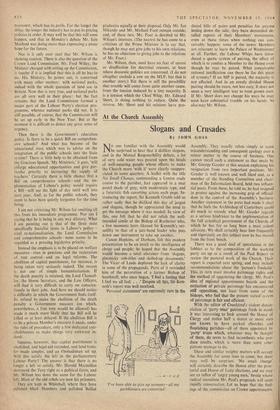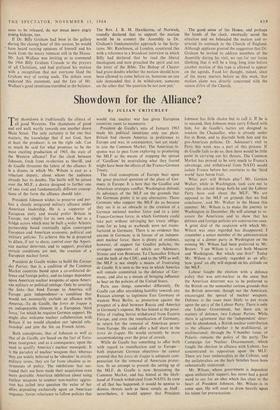At the Church Assembly
Slogans and Crusades
By JOHN GOSS No one familiar with the Assembly would be surprised to hear that it dislikes slogans, and in the Mutual Responsibility debate, a lot of very cold water was poured upon the heads of well-meaning people whose efforts to make the Church more 'with it' were clearly unappre- ciated in some quarters. A leaflet with the title No Small Change, commending a Lenten study course to the parishes, had appeared in a neat pastel shade of grey, with modernistic type, and a futuristic fish cavorting across each page. In- troducing the report, Sir Kenneth Grubb told us rather sadly that he disliked this day of jargon and slogans, though he appreciated the need to get the message where it was needed. In view of this, one felt that he did not relish the well- intended simile of the Bishop of Rochester who, a few moments later, likened Sir Kenneth's ver- satility to that of a jazz-band leader who puts down one instrument to take up another.
Canon Hopkins, of Durham, felt this modern presentation to be an insult to the intelligence of clergy and people; he hoped that the Assembly would become a total abstainer from 'slogans, gimmicky sub-titles and dolled-up documents.' The Vicar of Leeds deplored the lack of clarity in some of the propaganda. Parts of it reminded him of the peroration of a former Bishop of Southwell, who once began, 'I feel a feeling that I feel we all feel. . . .' Despite all this, Sir Ken- neth's report was well received.
'Personal statements' are extremely rare in the 'I've been able to give up sermons—all my parishioners are converted.' Assembly. They usually relate simply to some misunderstanding and consequent apology over a minor matter in the course of business. One cannot recall such a statement as that made by Mr. George Goyder at this session explaining his resignation from two important positions. Mr. Goyder is well known and well liked and, as a member of the Standing Committee and chair- man of the Information Board, held two influen- tial posts. From these, he told us, he had resigned in protest against the increasing grip of official- dom in the control of the Assembly's business. Another statement in the press had made it clear that he feels the Archbishop of Canterbury could do much to remedy what Mr. Goyder regards as a serious hindrance to the implementation of the full synodical government of the Church., of which he has for so long been a most ardent advocate. We shall certainly hear him frequently and vigorously on this subject now he has moved from the front bench.
There was a good deal of speculation in the lobbies as to the composition of the working party set up as a result of the Paul Report to review the pastoral work of the Church. Their report is expected next spring, and may include recommendations about the 'parson's freehold.' This in turn must involve patronage rights and the method of appointing the clergy. Mr. Paul's idea of regional appointments boards and the extinction of private patronage has encountered stiff opposition, not least from some of the bishops, who feel that the present varied stenl of patronage is fair and efficient.
With the editor of Crockford's violent denun- ciation of 'party trust' patronage fresh in mind, It was interesting to look around the Home of Clergy and notice half a dozen or more men one knows to have packed churches and flourishing parishes—all of them appointed by 'party' trusts which, whatever may be thought of them, do seem to find incumbents who pro- duce results, which is more than some other patrons manage to do.
These and similar weighty matters will occupy the Assembly for some time to come, but there may well be surp,rises. 'No small change' will certainly describe the House after the proc- torial and House of Laity elections, and we may ' see an influx of 'angry young men,' beside whose radical intentions Mr. Paul's proposals will seem timidly conservative. Let us hope that the find- ings of the commission on Crown appointments,
soon to be released, do not mean More angry young bishops, too.
If Dr. Billy Graham had been• in the gallery during the closing hour of this session, he would • have heard varying opinions of himself and his Work from the weary remnant still in the House. Mr. Jack Wallace was inviting us to commend the 1966 Billy Graham Crusade to the prayers of all Christians, and had prefaced his motion with a recognition that not everyone liked the Graham way of saving souls. The debate soon endorsed this statement, and the fate of Mr. Wallace's good intentions trembled in the balance.
The Rev. J. R. M. Hawthorne, of Norwich, roundly declared that to support the motion would be to commit the Assembly to Dr. Graham's fundamentalist approach to the Scrip- tures. Mr. Rawlinson, of London, countered this with a reference to a broadcast interview in which Billy had declared that he read the liberal theologians and now preached the spirit and not the letter of the Bible. The Bishop of Chester had grave doubts whether the motion should have been allowed to come before us. Someone on one side demanded that it be withdrawn; someone on the other that 'the question be not now put.' The good sense of the House, and perhaps the hands of the clock, eventually- saved the situation and we beheaded the motion and re- stricted its outreach to the Church of England. Although applause greeted the suggestion that Dr. Graham be invited to address members of the Assembly during his visit, we ran for our trains thinking that it will be a long, long time before another motion of this type is allowed to appear on the agenda. Food for thought, indeed, since of the many matters before us this week, that motion alone was directly concerned with the raison d'être of the Church.











































 Previous page
Previous page